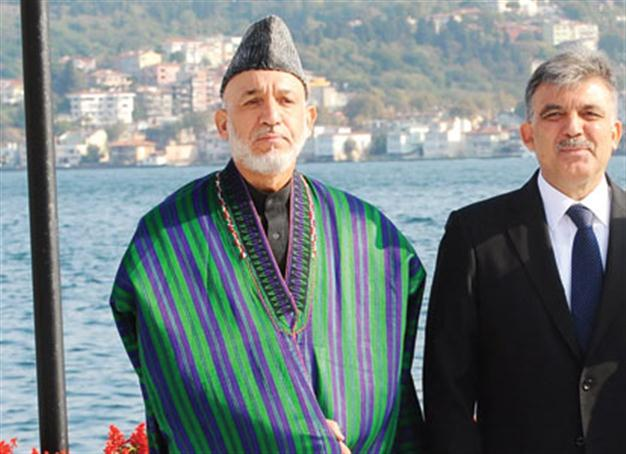Istanbul process launched for Afghanistan
SEVİL KÜÇÜKKOŞUM ISTANBUL- Hürriyet Daily News

Karzai seeks more support from neighbors on security. DAILY NEWS photo
Fourteen countries involved in Afghanistan, including neighbors China, Pakistan and India, have agreed to an initiative called the “Istanbul process,” which aims for regional security cooperation, according to a joint statement.
Officials from countries involved will work on the measures in order to create joint regional projects, while the outcome will be presented to the ministerial meeting of the initiative in Kabul next June.
“We have [created] the Istanbul process, which sets forth concrete mechanisms and proposals, including confidence-building measures,” Foreign Minister Ahmet Davutoğlu said yesterday in a joint press conference with his Afghan counterpart, Zalmai Rassoul.
Afghanistan requested that the initiative evolve into an agreement which would be binding for participant countries but some other regional countries preferred to move at a slower pace, a Turkish Foreign Ministry official told the Hürriyet Daily News.
The process would evolve gradually and regional countries will decide where it will lead, the Turkish diplomat said.
Representatives from 20 countries and international organizations gathered in Istanbul yesterday aiming to chart the way ahead for Afghanistan. A U.S.-led NATO mission to the country is scheduled to pull out all foreign combat troops by the end of 2014.
“To realize the potentials of regional economic cooperation that is so crucial for the future, the region must come together in cooperation and solidarity to a degree that is not yet achieved. Today in Istanbul we are coming together to subscribe to a new vision of regional cooperation,” Afghan President Hamid Karzai said at opening ceremony of the conference.
“There will be no hope for peace in Afghanistan without help from its neighbors to combat ‘terror groups,’” he said.
Karzai asked for Islamabad’s support to get the top Taliban leadership based in Pakistan to join the peace process on Afghanistan. “Our hope is is that with help of our brothers in Pakistan, we’ll manage to [wean] the leadership of Taliban off some of the long-established network support that is enjoyed outside of Afghanistan and integrate them into the peace process,” the Afghan leader said.
‘Afghanistan can’t fight alone’
The bundle of issues Afghanistan is dealing with, including terrorism, extremism and human and drug smuggling, cannot be solved by a single country alone, Turkish President Abdullah Gül said.
The statement mentions on cooperation on border security, combating against terror and all kinds of extremism based on violence, measures against human and drug trafficking, along with economic and cultural collaboration and visa facilitation. References to radicalism will be removed from education curriculums, according to the declaration.
“Resolutely combating and eliminating terrorism in all its forms and manifestations and violent extremism and preventing safe havens for terrorists and terrorism in the region” is among the principles of the declaration.
The declaration also condemned the killing of former Afghan President and peace envoy Burhanuddin Rabbani.
The conference took place a day after a trilateral summit hosted by Gül brought together the presidents of Afghanistan and Pakistan in a bid to ease tensions between the two neighbors. Talks on Nov. 1 saw Afghanistan and Pakistan agree to cooperate with an investigation committee, including Turkey’s presence, into the assassination of Rabbani.
Karzai and Pakistani President Asif Ali Zardari, with the participation of their military and intelligence chiefs, had a dinner on Nov. 1, a first since tension rose between the two neighbors, a Turkish diplomatic source said.
Absent from yesterday’s conference was U.S. Secretary of State Hillary Clinton, who canceled her participation after her 92-year-old mother died. Her deputy William Burns took her place.
On the sidelines of the conference, Davutoğlu had bilateral meetings with several ministers, including his Iranian counterpart.
















